Discussion Topic: Does the Title of the New NBC Improv Show, Thank God You're Here, Take the Lord's Name in Vain?

Here are a few thoughts I have on this kind of subject, and I would appreciate your discussion in the comments.
(1) Contrary to what is often taught from pulpits, the command "You shall not misuse the name of the LORD your God, for the LORD will not hold anyone guiltless who misuses his name" (Ex 20:7 TNIV), is about more than mere swearing. What does it mean to misuse the Lord's name? Well, the Hebrew word, נָסָא/nasah, translated as "misuse" in the NIV/TNIV/NLT or "take...in vain" in many Tyndale tradition translations is often defined as to lift, carry, take. This is a word that implies action. I once heard it described as having the imagery of carrying a banner or flag into battle--it denotes belonging, allegiance. To carry the name of the Lord in vain can even mean to claim that one belongs to the God of the Bible and then live as if that were not true. So certainly the commandment is against more than simply referring to God without any real intent of meaning, but it would also include this as well.
(2) The use of the term "God" with meaningless intent is (sadly) part of common speech, often even among Christians. Personally, I believe I am standing on solid biblical ground in suggesting that believers should not use it as such. The counter claim could be made that "God" is not actually God's name. This is true, but "God" is used interchangeably not only in our speech, but even in the Bible with the divine name. Certain religious Jews will not even write the generic word, but will offer something such as "G-d."
(3) I can't imagine that this title would have been used in a television show a generation ago. I can still remember hearing the word "God" beeped out of discussions on television many years ago.
(4) What is the proper Christian response toward culture? Granted, we cannot expect non-believers to act or speak like believers. Do we even have any business questioning what television networks choose to call a show? Well, I think we do because I'm certain that NBC would want as many people as possible to watch. NBC doesn't look at this as a show aimed at non-Christians, but a show aimed at as many viewers as will tune in. Therefore, Christians, too, are part of the target audience. There may be a need at least to call the network into question regarding the name of the show. I don't really think they will change it, as it is an American version of an overseas show by the same name. But it might be a good idea to call their attention to such things, that in my opinion, are offensive--even if they don't understand why.
These are my thoughts. I'm not calling for a boycott or anything of that nature. I am asking for feedback to know what you think. Am I making a big deal out of nothing? Should, at the very least, concerned Christians (and religious Jews) make their concerns known to NBC?
Let me know what you think.
Nonsense for Today

Every time I watch Law & Order: Criminal Intent, I think to myself that Eric Bogosian, who plays Captain Danny Ross, looks like a character who would have been somebody's uncle on the Brady Bunch 35 years ago.
His curly perm and even his voice seem to have time warped him straight from an early seventies sitcom.
Okay... back to more serious topics...
My FREE* Plasma TV
For Josh to get his MacBook Pro, he kept extremely detailed records in Excel spreadsheets regarding when he signed up for offers, how long the trial period was, when they confirmed his cancellation, etc. In the end, if a person sends back everything and participates in the offers only to the barest of minimums, he or she should be out somewhere about $100, which is not a bad investment that returns a $2,000 value (the price of Josh's MacBook Pro). I won't go into all his details, but I will point you to two very significant posts of his (especially if you want to try this yourself):
"How I Got a Mac for Next to Nothing"
"The Free Mac, Part II"
"Counting the Macs"
So, anyway, I decided back in the middle of November to try this myself. I didn't want a new laptop though--I'm still delighted with my black MacBook. However, if there's any luxury item out there that I'd never pay for on my own, it would have to be a high-def television. So I ran a google search for "high-def television" and found an ad from the same company Josh with which Josh participated for a "Gift Card for a $2,000 Plasma TV" (I'd give you the link, but it's now expired). I had to complete 18 offers, which although seemed like a lot, turned out in the end to be pretty manageable. Although I didn't keep a spreadsheet like Josh's, I did record all the same kind of details in a MS Word file that he had done. Plus I made PDF files of all agreements and emails confirming cancellations as I returned items. It took me about three weeks to complete all 18 offers. Then I was given a link to download a PDF file which I had to fill out with where to send my gift card and also tax forms since the card is worth $2,000.
The whole time I was working on this, I referred to it as "my scheme to get a free plasma TV." Kathy simply referred to it as my "scam" because she was skeptical till the end that it would actually work, especially with so little investment. Nevertheless, last Saturday I opened the mail to find a $2,000 Visa Gift Card in my name. Yeah, I know...I couldn't believe it either!
I talked it over with Kathy. Although the offer was for a gift card for a plasma television, technically we could do anything we wanted with the money because it was a generic Visa gift card. Heck, we could even withdraw the money from an ATM. Obviously, I knew there were lots of things we could do with $2,000 but Kathy (wonderful wife she is) said that I had wanted a television to begin with, I had worked hard to stay on top of the offers, and that I should stick to my original plan. So I set off Monday to get the television.

I'm absolutely delighted with the way everything has turned out. The television is great for high-def movies, games on the Xbox 360 and the handful of HD channels our cable service offers. I don't have surround sound, but the television has an audio mode that emulates it, and at the just right volume, our living room feels like a movie theater. This is the first television that I could honestly use to double as a CD music player as well.
In the end, I don't think I could have ever justified paying for something like this with hard earned money, even if I saved for it over time. But when someone says, "Here's $2,000--go get a plasma TV... Well, I just can't turn that down.
This really does work if you stay on top of it. See the links to Josh's posts above if you want to pursue it.
Sympathy for the Devil? ABC Family's "The Fallen"
(Genesis 6:4, HCSB)
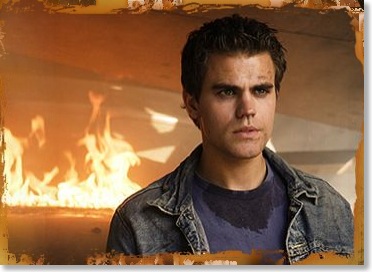
Out of curiosity, I watched a repeat of the premier of The Fallen tonight on the ABC Family Channel. Knowing that they were basing the show's mythology off the rather obscure verses at the beginning of Genesis 6, I admit I was mildly intrigued. Here, with multiple typos left as they are other than my note of them (= sic), is ABC Family's synopsis from the website for The Fallen:
All Aaron ever wanted was a normal life. Newly adopted by Lori and Tom Corbett, Aaron believes that he finally has a chance to be like everyone else. Hes [sic] good at school. Hes [sic] on the wrestling team, and Vilma, the preiitest girl in school, knows hes [sic] alive. But on his 18th birthday everything changes.
Suddenly, Aaron has unusual powers and a strange dream haunts him. A homeless man name [sic] Ezekiel, who claims to be a fallen angel, tells Aaron that he is a Nephilim, or half-angel/half-human. Zeke warns Aaron that the Powers, an army of killer angels, are are coming to destroy him. If Zeke is right, then Aaron has been swept into a centuries-old battle between the Powers and the Fallen, a group of angels banished from heaven. Aaron shakes off Zekes [sic] ravings but startling events lead him to think that maybe Zeke could be right. There is a mysterious man in a black [sic; word is missing, possibly "coat"?] following him. His newfound abilities seem to be getting stronger, and he sees signs in the most unlikely places. When Aaron comes face to face with his fate, he can no longer deny the truth.
Caught in a celestial war waged on Earth and haunted by an ancient prophesy [sic], Aaron is forced to make a difficult choice. His chances of being normal are gone, but is he The One?
There you have it, Frank Peretti meets Highlander. The two-hour premier (there are plans for six more hours in 2007) was fairly light popcorn stuff. It felt like a fantasy version of a coming-of-age story on an After-School Special of years gone by. I guess that's to be expected since the movie was based on the young adult novel of the same name by Tom Sniegoski. I have no idea how close the movie was to Sniegoski's original story having not read it, but I wasn't overly impressed with the cinematic interpretation.
The story itself felt very contrived and predictable. When Aaron's dog gets hit by a car right before a commercial break, it was pretty evident that this would be a reason to highlight Aaron's developing "angel powers." The high school drama is fairly typical. Aaron is the new guy at school and suddenly the most popular girl takes notice of him. He clashes with the jocks on the wrestling team of which he is a member--perhaps as an allusion to Jacob wrestling the angel in Gen 32?
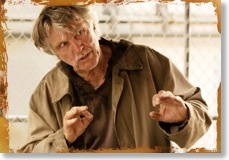

The mythology (I would really hate to call it theology) is one of the more bizarre aspects of The Fallen. Satan is never directly referenced except as "the powerful angel who led a rebellion in heaven." The story takes an extreme mythological interpretation of Genesis 6:1-4, to say that fallen angels have procreated with humans resulting in half angels/half human hybrids called the Nephilim. A hit squad of angels called the Powers has been commissioned by God to eliminate any of these half-breeds they can find. If the Angels have to torture and even kill normal humans in order to find the Nephilim, well, these are merely collateral damage. The battle near the end with what looked like flaming light sabres was quite laughable.
Thus you have a story that makes the angelic hosts look like the bad guys and sympathy is given to the fallen angels and especially their half human offspring who are killed in spite of their pleas for mercy. To make things even more bizarre, it seems there is an ancient prophecy (not a biblical prophecy, mind you) that says a Nephilim will arise who will stand in the gap between God and the fallen angels offering them redemption. Of course, Aaron (appropriate named after Moses' brother, the first high priest of Israel) turns out to be this prophesied Nephilim, also known as--shades of Highlander and the Matrix trilogy--The One.
Skerritt's character also has to deliver a politically correct line equating the God of the Bible with Allah, Shiva, and any other concept of God. Never mind the irreconcilable differences between these theologies. If there was any question as to whether the writers have a respectful view toward the Judeo-Christian tradition, this clearly demonstrates that they do not.
The Bible, of course, makes no mention of redemption regarding fallen angels. Perhaps their sin was even more egregious because of their intimate knowledge--even greater than ours--of the one true God. But that also makes us ask whether a mythological interpretation of Genesis 6:1-4 is the best one. Although the interpretation regarding relations between angels and humans is very old and has had many notable proponents, it seems to be contrary to other statements in the Bible including Jesus' remarks about angels: "For when they rise from the dead, they neither marry nor are given in marriage but are like angels in heaven" (Mark 12:25, HCSB). Plus the idea of angelic/human coupling seems a bit repugnant to me under any condition.
Another line of interpretation would identify the sons of God with "the godly line of Cain" while the daughters of men are said to be "the sinful line of Cain." This seems unsatisfying as well. A better solution is offered by Walter Kaiser in Hard Sayings of the Bible:
The preferable interpretation of this passage is the sociologically mixed view. "Sons of God" is an early, but typical, reference to the titularies for kings, nobles and aristocrats in the ancient Near Eastern setting. These power-hungry despots not only lusted after power but also were powerfully driven to become "men of a name" (or "men of renown"-- Gen 6:4).
In their thirst for recognition and reputation, they despotically usurped control of the states they governed as if they were accountable to no one but themselves. Thus they perverted the whole concept of the state and the provision that God had made for some immediate amelioration of earth’s injustices and inequities (Gen 6:5-6; see also Gen 10:8-12). They also became polygamous, taking and marrying "any of [the women] they chose" (Gen 6:2).
What evidence can be produced for the correctness of this view? There are five lines of evidence. (1) The ancient Aramaic Targums render "sons of God" as "sons of nobles" (Targums of Onkelos), and the Greek translation of Symmachus reads "the sons of the kings or lords." (2) The word gods (Hebrew elōhîm) is used in Scripture for men who served as magistrates or judges ("Then his master must take him before the judges [elōhîm]," Ex 21:6; see also Ex 22:8; Ps 82:1, 6). (3) Structurally, the account of the Cainite Lamech (Gen 4:19–24) and that of the "sons of God" in Genesis 6:1-4 are very much alike. In each there is the taking of wives, the bearing of children and the dynastic exploits. The former passage ends with a boast of judgment by Lamech, and the other ends with God’s decree of judgment. Lamech practiced bigamy (Gen 4:19), and he enforced his policies by using tyranny. The portraits are parallel and depict states of tyranny, corruption and polygamy. (4) Near Eastern discoveries have validated the pagan use of all sorts of gods' and goddesses' names in order to give more clout and prestige to the governments of Egypt and Mesopotamia--hence the title "sons of God."
The fifth and final line of evidence concerns the nep̄lîm/gibbôrîm of Genesis 6:4. The word nep̄lîm occurs only here and in Numbers 13:33, where it refers to the Anakim, who were people of great stature. The root meaning of the word nep̄lîm is "to fall." However in Genesis 6:4 the nep̄lîm are associated with the term gibbôrîm. The word gibbôrîm comes from gibbôrîm, meaning "a mighty man of valor, strength, wealth or power." Nimrod, in Genesis 10:8, was such a gibbôrîm. He also was clearly a king in the land of Shinar. Hence the meaning of nep̄lîm/gibbôrîm is not “giants,” but something more like "princes," "aristocrats" or "great men."
Genesis 6:1–4, therefore, is best understood as depicting ambitious, despotic and autocratic rulers seizing both women and power in an attempt to gain all the authority and notoriety they could from those within their reach. Their progeny were, not surprisingly, adversely affected, and so it was that God was grieved over the increased wickedness on planet Earth. Every inclination of the hearts and thoughts of humanity was evil. Thus the flood had to come to judge humankind for the perversion of authority, the state, justice and human sexuality.
This seems to be the most sensible interpretation of Gen 6:1-4 to me, but your mileage may vary.
As an aside, I must ask what happened to the purpose of the ABC Family channel? ABC bought the network from Pat Robertson's media company when it was originally known as the CBN Family Channel. I'm no fan of Robertson or CBN, but I'll admit there was some occasional good programming when it was under CBN control. Much of The Fallen seemed quite unsuitable for primetime family viewing as it was rated TV-14 for language and violence. The language, although tamer than what you would find in a rated-R movie, seemed unnecessary and even inappropriate at times. Again, it makes me question exactly how "family"-oriented ABC Family actually is.
Reflections on "God or the Girl"
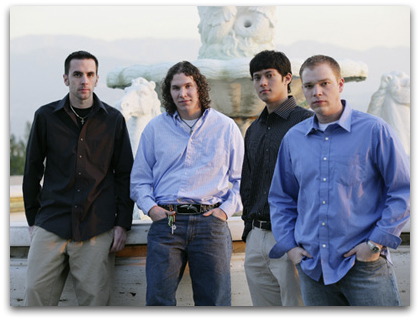
Above: Mike, Dan, Steve & Joe seek to decide between celibacy in the Catholic priesthood or married life as laymen.
Tonight, I caught the third episode of of the A & E miniseries/documentary, "God or the Girl." The series follows four single young men for a number of weeks as they wrestle with whether God is calling them to the priesthood or to a life of marriage. I'll admit that upon hearing about "God or the Girl," I was a bit biased. I assumed that the subject would be approached from a highly sensationalistic viewpoint. Would the young men commit themselves to God, only to have the producers parade a number of scantily-clad young women before them? What's it going to be--GOD? Or the GIRL?
Perhaps the show would have been like that if it had been produced for Fox TV. Fortunately, this is an A&E show, and I found they treated the subject matter and the faith of these young men with the utmost respect. I felt for these young men. They all take their faith very seriously. They want to be true to the call of God on their lives. Joe stated a number of times, "I just want to be 100% sure." Well... good luck with that.
Look, I know what it's like to struggle with God's call upon my life. Such things should be taken very seriously. I never really felt called to celibacy though. Okay, I'll be honest... I don't think I ever even PRAYED about that one. But you've got to admire the folks, regardless of denominational affiliation, who take a vow of singleness/celibacy.
The Apostle Paul seems to exalt singleness above married life:
“I would like you to be free from concern. An unmarried man is concerned about the Lord’s affairs—how he can please the Lord. But a married man is concerned about the affairs of this world—how he can please his wife— and his interests are divided. An unmarried woman or virgin is concerned about the Lord’s affairs: Her aim is to be devoted to the Lord in both body and spirit. But a married woman is concerned about the affairs of this world—how she can please her husband. I am saying this for your own good, not to restrict you, but that you may live in a right way in undivided devotion to the Lord.
If anyone is worried that he might not be acting honorably toward the virgin he is engaged to, and if she is getting beyond the usual age for marrying and he feels he ought to marry, he should do as he wants. He is not sinning. They should get married. But the man who has settled the matter in his own mind, who is under no compulsion but has control over his own will, and who has made up his mind not to marry the virgin—this man also does the right thing. So then, he who marries the virgin does right, but he who does not marry her does better."
(1 Cor 7:32-38, TNIV)
I feel for the young men's struggle as it's depicted in "God or the Girl." I regret that for them and their denomination (the Roman Catholic Church) that it's an either/or proposition to begin with. Although my own denomination probably incorrectly downplays a call to single life, we don't make our seminary students choose between ministerial service and family life. In fact, married life is generally encouraged for the sake of propriety.
I know I run the risk of offending my Catholic friends, but I honestly believe that the continued requirement of the Catholic Church for their priests not to marry is a mistake. Although there are some very good, capable and qualified priests in the Catholic Church, I believe that by continuing this nonbiblical requirement, they unnecessarily exclude a large number of extremely gifted and otherwise qualified men who could be priests. And, although I don't want to pursue the subject further at this point, I believe that some of the recent problems with pedophile priests stem from this mistake. Further, the Catholic Church is having more and more difficulty finding young men willing to "forsake the world" in surrender to the priesthood. Allow these priests to have families and the shortage of quality candidates will disappear.
The truth is that there was no requirement forbidding priests to marry in the early church. It was not even an issue until maybe the 4th century with Augustine, who greatly struggled with sexual desire before his conversion and Jerome who took a low view of both sexuality and women in general. But such ideas are neither biblical nor Christian, although they've been mistakenly taught at times in the history of the church. And priests were not strictly forbidden to marry for at least the first 1,000 years of church history, if not longer.
Again, I feel for Mike, Steve, Dan, and Joe. Their sincere desire to please God is admirable. However, I hope that eventually the leaders of their denomination will have the wisdom to rethink their traditions, especially in light of biblical teaching on the subject.
Book of Daniel Sealed for All Eternity
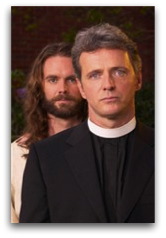
According to the Chicago Tribune:
Originally planned as a limited-run series of eight episodes, the controversial program about a pill-popping Episcopal priest with a troubled family has been pulled by NBC after airing for only three weeks. The series' ratings had not been great since its Jan. 6 debut, and the low ratings for the Jan. 20 outing of the show were the final straw. According to NBC, no further airings are planned.
I'm sure that there will be those who will criticize the Christian community for supposedly causing its cancellation. But I don't think we were the ones who killed it. It was practically stillborn to begin with. Besides all the ethical criticisms of the show, it primarily suffered from three things: bad writing, bad acting and Hollywood producers out of touch with the mainstream.
The demise of The Book of Daniel should come as no surprise. As I suggested in my initial review of the show, there was no way it could last for very long:
My hunch is that tonight's broadcast probably got decent, if not good ratings because of all the publicity the show received leading up to its debut. However, after that, the audience will begin to shrink. Add to that the time slot given to the show: 10 PM EST on Friday night. That has to be the worst time slot a show could receive.
My prediction is that by mid-spring, The Book of Daniel will be sealed for all of eternity (my apologies to ch. 12, v. 9 in the real Book of Daniel).
Mid-spring? Evidently I was too kind.
This Is Not Your Father's Book of Daniel (Pun Intended)
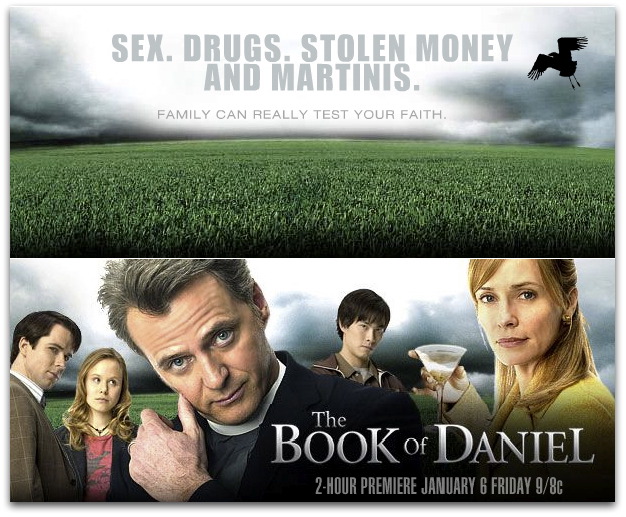
I remember hearing about The Book of Daniel almost a year ago. My guess is that it's been in production for a while, but may have been shelved for a time. I really don't know. Tonight NBC aired two episodes, the first of which must've been the pilot because hair lengths were different for some actors in the second hour (you know, they think we never notice such things). The show has garnered a lot of attention from a variety of circles, including negative reviews prior to its airing from groups like the American Family Association. I'm not sure how fair it is to condemn a television before it airs, and I naturally wondered if some of the negative buzz wasn't a bit exaggerated.
After watching the two episodes that aired tonight, I have to conclude that all the negative attention is not unwarranted. I tried to think of the best way to sum up the flavor of The Book of Daniel, and finally it hit me. How can I describe this show? Well, try mixing 7th Heaven with Desperate Housewives, and what do you get? Why, you get The Book of Daniel.
Here's the lowdown on the characters. I'll use the picture above and go from left to right.
Peter Webster (Christian Campbell): The gay son and oldest child of the show's main protagonist. Peter describes himself as being out of the closet, but not wanting to march in parades. Because his grandfather does not know he is gay, he allows himself to be set up with a young woman from church. Hilarity ensues in future episodes, I'm sure.
Grace Webster (Alison Pill): The only daughter. She's about 16, and shows talent as a potential manga artist. However, she needs money for software necessary for her craft, so she begins selling marijuana for which she gets arrested. Forced into community service, she meets another juvenile offender who agrees to download all the necessary software for her illegally from the internet in exchange for Grace's last bag of drugs.
Daniel Webster (Aidan Quinn): Episcopal Priest and main character. Webster comes across as fairly unsure of himself and his abilities, much like a new pastor fresh out of seminary rather than an experienced clergyman. He seems to have an addiction to prescription painkillers which he tends to take not for pain, but for stress. And he definitely has stress. His brother-in-law has run off with $3 million dollars of his church's money while his own family members have enough dysfunctions to fill any counselor's entire schedule. Fortunately (?) for him, he can talk directly to Jesus, who appears at regular intervals to him. Of course, in real life, if your pastor told you he had two-way conversations with Jesus, whom he could also see, you might want to call the men in the white coats. Quinn is a fairly decent actor, but in this role comes across as a poor man's Mel Gibson.
Adam Webster (Ivan Shaw): Adopted 16-year-old son, originally from China. Adam has quite the reputation as a ladies man and an out-of-control libido. He even propositions his sister at one point in the show, because as he explains it, they aren't actually related.
Judith Webster (Susanna Thompson): The supportive wife. There's not much to say about this character as the role was written fairly flat in the first two episodes, although she did seem to show a penchant for martinis.
Other Characters: Ellen Burstyn plays Dr. Beatrice Congreve who is the bishop overseeing (is that redundant?) Daniel Webster. She is very critical of a sermon of his in which he seems to condone giving into temptation, but later is shown to take a liking to Webster's prescription medicine. Toward the end of the second episode, we discover that she is sleeping with Webster's father (James Rebhorn) who is also a bishop. Of course, he's one of the most unlikable character's in the show, and the last person you'd want to have as your own minister. But his wife (Webster's mother) is suffering from Alzheimer's, which I suppose is why he feels free to cavort with Bishop Congreve. And then, there's Jesus, played by Garrett Dillahunt, whose portrayal reminded me more of a sixties hippie. I expected him to say "Far out, man" any second.
So what's the big deal? Well, there are a number of problems. In some circles people have praised this show because supposedly it depicts real life and the fact that no family is perfect. Well, I agree that no family is perfect, but the family in The Book of Daniel seems to be drawn more from families in daytime soap operas than the average family I know.
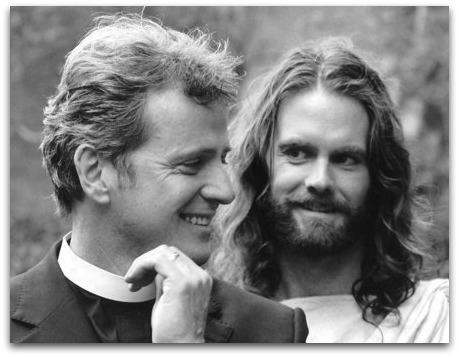
Early in tonight's pilot, the Rev. Webster (Quinn) guiltily rattles a bottle of Vicodin and informs Jesus (Garret Dillahunt) that he's got his consumption of pain-killers under control.
"Riiiight," says Jesus.
"Could you fit more judgment into that 'Riiiight'?" asks the reverend [sarcastically].
"Actually," replies Jesus, "yes, I could."
More examples? Homosexuality is declared to be genetic and normal, thus perpetuating this popular myth in spite of the fact that no studies have confirmed this with conclusive evidence. Also, during a subplot involving the reverend giving marriage counseling to a young couple, it's assumed that the two are living and sleeping together. "You mean you two are living in sin?" asks Webster. The man looks startled. "Just kidding!" says the reverend, slapping him on the shoulder. In the counseling session he even asks them about their sex life.
Nothing is condemned. When Webster is concerned over his adopted son's sex life, Jesus says "He a good kid. Let him be a kid." And that's the problem. Over and over similar statements are made. He's a good kid. She's a good woman. She's a good girl. When Webster objects to being rebuked by the bishop for his sermon affirming the benefits of sin (it makes us appreciate forgiveness more!), she responds with "Well, that's the business we're in." But if that's the business they're in, the business is going under.
The Book of Daniel is the brainchild of Jack Kenny, who has described himself in numerous interviews as an ex-Catholic gay man who has based the family in the show on that of his "life partner." Although he is not a practicing Christian, he says that he has respect for the religion. Really?
Consider for a minute that this show would have never seen airtime if it it revolved around a Muslim or a Buddhist family. Can you imagine a red-robed monk dialoguing with the Buddha? Or an imam engaged in conversation with a visual depiction of Muhammad? There would be jihad on Hollywood Boulevard over such.
And I don't think it's coincidental that Webster is an Episcopal priest. Of all denominations in the US, the average Episcopalian might be the least likely to object. And in fact, some have even praised the show for all the "positive" attention the Episcopal Church stands to receive. Like Jesus said in the first episode, "Riiiight."
As I mentioned earlier, I first heard about this show about a year ago. The context was surrounding a host of new programming the networks were considering in response to the favorable response toward Mel Gibson's The Passion. Surprised by America's reception of a movie that took spirituality seriously, Hollywood began searching for other spiritually related proposals previously snubbed. One of these was The Book of Daniel. They figured that if America would watch a whole film about Jesus, they would be willing to see him as a character on a weekly TV series. But all spirituality is not the same. And this is where Hollywood never gets it. The same core audience that went to see The Passion is not going to be interested in The Book of Daniel. And although it's being compared with Desparate Housewives, they're not going to attract those viewers either.
My hunch is that tonight's broadcast probably got decent, if not good ratings because of all the publicity the show received leading up to its debut. However, after that, the audience will begin to shrink. Add to that the time slot given to the show: 10 PM EST on Friday night. That has to be the worst time slot a show could receive.
My prediction is that by mid-spring, The Book of Daniel will be sealed for all of eternity (my apologies to ch. 12, v. 9 in the real Book of Daniel).









